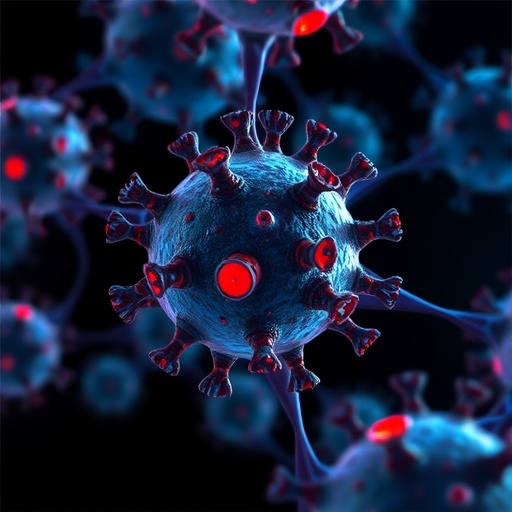In the ever-evolving landscape of cancer research, a recent study sheds light on the intricate relationship between inflammatory mitochondrial signaling and viral mimicry, a connection that could revolutionize our understanding of cancer biology. Conducted by a team of researchers, including notable names such as S. Nesci, S. Marchi, and J. Hu, this pivotal investigation has been published in the Journal of Translational Medicine. The findings may open new avenues for therapeutic interventions by linking the mechanisms of inflammation and viral-like behaviors within cancerous cells.
To comprehend the significance of this research, it is essential to first delve into mitochondrial signaling. Mitochondria are not merely the powerhouses of the cell; they also play a crucial role in signaling pathways that regulate cellular responses to stress, apoptosis, and inflammation. In the context of cancer, dysregulation of these pathways can lead to altered cellular behaviors, contributing to tumor growth and metastasis. The study emphasizes how inflammatory responses linked to mitochondrial dysfunction can foster an environment conducive to cancer progression.
One particularly fascinating aspect examined in this research is the phenomenon of viral mimicry in cancer cells. Cancerous cells often acquire traits reminiscent of viral infection, leading to the classification of certain tumors as “viral mimicry” phenomena. This process can manipulate immune system responses, allowing the tumor cells to evade detection and destruction. The research provides compelling evidence that mitochondrial signaling pathways are intertwined with these viral mimicry mechanisms, suggesting a shared evolutionary path that cancer cells might exploit.
The researchers employed sophisticated methodologies to explore these interactions. Utilizing advanced imaging techniques and molecular assays, they were able to demonstrate how cancer cells can mimic viral behaviors through the activation of specific mitochondrial pathways. These findings not only validate the hypothesis of viral mimicry in cancer but also highlight the role of inflammation as a driving force in this process. This indicates that targeting mitochondrial signaling pathways could potentially offer novel therapeutic strategies for cancer treatments.
One hypothesis arising from this study is that targeting the inflammatory signaling pathways associated with mitochondrial function could disrupt the viral mimicry phenomena observed in cancer cells. Given that many cancer therapies aim to enhance immune recognition and destruction of tumor cells, understanding and manipulating these pathways may offer a valuable tool in oncology. By deciphering how mitochondrial signaling interacts with viral mimicry, the researchers propose tailored treatment regimens that could improve patient outcomes.
Furthermore, the implications of these findings extend beyond just cancer biology. The interplay between inflammation and mitochondrial function has been implicated in various diseases, suggesting that insights gained from this study could be applicable in understanding other inflammatory and degenerative conditions. This cross-disciplinary relevance emphasizes the significance of understanding cellular signaling pathways in a broader biomedical context.
Importantly, this research does not exist in a vacuum. The historical backdrop of cancer research is marked by significant milestones in understanding the role of inflammation. The link between chronic inflammation and cancer has been established for decades, yet the precise mechanisms remain elusive. By situating their findings within this broader context, the authors hope to contribute a piece to the puzzle that ultimately leads to transformative cancer therapies.
In addition to presenting new data, the researchers critique existing models that have explored mitochondrial dysfunction and inflammation separately. They argue that a more integrated approach is necessary for a comprehensive understanding of cancer biology. By elucidating the connection between these seemingly disparate areas, the study advocates for a shift in how researchers conceptualize cancer progression and treatment strategies.
The reception of these findings in the scientific community is anticipated to be significant. As ongoing debates continue to explore the relevance of the tumor microenvironment in cancer, the study adds a crucial dimension by integrating mitochondrial function and immune signaling. Future research directions emerging from this work will undoubtably focus on the potential for combination therapies that disrupt both mitochondrial and inflammatory signaling pathways to enhance treatment efficacy.
As we move forward in oncology, this compelling study encourages a more nuanced perspective on tumor biology. Researchers and clinicians alike may be prompted to consider the potential connections between mitochondrial function and viral mimicry in their approaches to diagnosis and treatment. The insights gained from Nesci and colleagues’ study could lay the groundwork for innovative strategies that enhance our ability to manage and ultimately conquer cancer.
Ultimately, the key takeaway from this research is the confirmation that inflammation and mitochondrial signaling are not just peripheral aspects of cancer biology; they are central players in the evolutionary game of tumor progression. Understanding how these pathways interact could be the critical element that allows us to develop therapies that are not only more effective but also more targeted in their approach to combating cancer.
In conclusion, the study authored by Nesci, Marchi, Hu, et al. serves as a groundbreaking exploration of the nexus between inflammatory mitochondrial signaling and viral mimicry in cancer. The implications for both basic research and clinical practice are profound, paving the way for future studies that delve deeper into the intricate biochemistry of cancer cells. As the quest for effective cancer therapies continues, insights from this research could very well be a significant step toward achieving that elusive goal of effective cancer treatment.
Subject of Research: Inflammatory mitochondrial signaling and viral mimicry in cancer.
Article Title: Inflammatory mitochondrial signalling and viral mimicry in cancer.
Article References:
Nesci, S., Marchi, S., Hu, J. et al. Inflammatory mitochondrial signalling and viral mimicry in cancer. J Transl Med 23, 982 (2025). https://doi.org/10.1186/s12967-025-06931-3
Image Credits: AI Generated
DOI: 10.1186/s12967-025-06931-3
Keywords: Cancer, mitochondrial signaling, inflammation, viral mimicry, tumor microenvironment.




